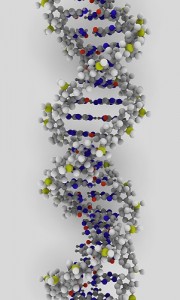Genes: predictor of academic ability?
I found an article today about British researchers who are analyzing the DNA of 4000+ schoolchildren with the goal of finding a relation between the kids' genes and their academic abilities.

The reason I bring this up is not because the researchers found a gene to explain why you failed your math test, but because the article falls heavily into the "nature vs. nurture" trap. For those of you unfamiliar, nature vs. nurture is the debate over the relative importance of innate qualities built-in from the chromosomes ("nature"), versus personal experiences, environment, and upbringing ("nurture") in determining individual physical and behavioral differences. Really, it shouldn't be a debate: organisms' traits are a result of the interaction of what they start with and where they grow up: nature and nurture. The context in which any organism develops is remarkably important in determining which genes are expressed and how they interact to produce behavior.
Back to the article. There's one paragraph in particular that gets me:
"Research into height, for example, has picked out 300 genes that affect how tall people will grow, but even these genes can only explain 15% of the total variations in human height. It implies that hundreds more genes must also play a part."
No, that's a false choice. What's implied is that there could be other genes involved, but - and here's a novel thought - maybe the environment (e.g., nutrition) plays a role? A little bitsy part? Maybe?
A little googling:
In hopes that it was just the reporters who were being deterministic, not the researchers themselves, I set out to find more information.
Robert Plomin of King's College, London, is the behavioral geneticist cited in the article. He's currently performing a huge study of British twins. I've found several articles stating that he's a "pioneer in bringing nature and nurture together," and instead of calling it a "nature vs. nurture" debate, he's said to have call it (much more appropriately) "nature and nurture." That's reassuring. I'd have to read a few of his papers to be certain, but my interim conclusion is that it's just the reporters.
If you're interested, I also recently came across a popular article on the gender myth and genetic differences in men and women. It happens to cite Robert Plomin, too.





F.A.R. said:
I confess, I was hoping that last link would take me to a neuroscientist’s account of why gender itself is a myth. The article I found was pleasant as well, though.
I look forward to a time when we have a richer set of information available on the interplay of genetic and environmental factors. I do expect that we’ll find “Y trait only if X gene” relationships, but it would be pretty silly to expect “Y trait if X gene” relationships. That said, for certain basic traits–specifically, for traits that more recent wide-spread adaptations rely on, presumable traits like having lungs or fingers–the environmental factors will be something one can take for granted, like an oxygenated environment or the ph of the womb environment. Perhaps it will be easier to create a conditional map of genome expression if we start with those traits’ triggers and then work up to traits expressed as a result of social circumstances (like the “warrior gene” that only results in violent behavior if one has been subjected to a violent environment).
Sept. 20, 2010, 9:09 a.m.
Jacqueline said:
I did add the “popular” adjective before “article” in hopes that it wouldn’t get your hopes up too much. (If you come across links to neuroscientists’ accounts of gender itself being a myth, do share!)
My present fixation on everything being gene-environment interactions is no doubt influenced by the Things In Context seminar, where everything is context and when you get right down to it everything is interactions from a single cell all the way to the day you die. That said: I agree with you and expect that we will find genes that influence the norm of possible reactions – e.g., no people are only a foot high, but nutrition and other environmental factors influence whether you’ll be five foot two or five foot five. And you’re right, some environments are relatively consistent across generations. I like the idea of a conditional map.
Sept. 20, 2010, 12:22 p.m.